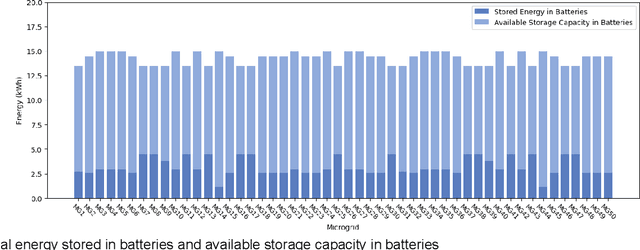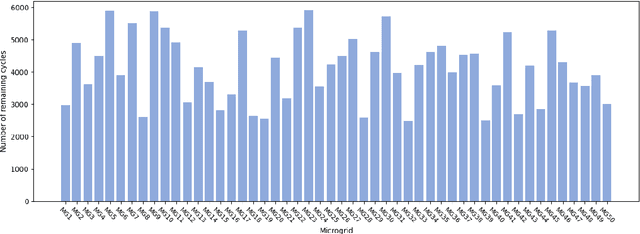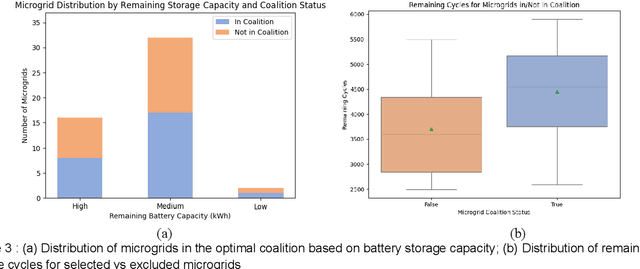Ionut Anghel
Microgrids Coalitions for Energy Market Balancing
Jun 06, 2025



Abstract:With the integration of renewable sources in electricity distribution networks, the need to develop intelligent mechanisms for balancing the energy market has arisen. In the absence of such mechanisms, the energy market may face imbalances that can lead to power outages, financial losses or instability at the grid level. In this context, the grouping of microgrids into optimal coalitions that can absorb energy from the market during periods of surplus or supply energy to the market during periods of is a key aspect in the efficient management of distribution networks. In this article, we propose a method that identify an optimal microgrids coalition capable of addressing the dynamics of the energy market. The proposed method models the problem of identifying the optimal coalition as an optimization problem that it solves by combining a strategy inspired by cooperative game theory with a memetic algorithm. An individual is represented as a coalition of microgrids and the evolution of population of individuals over generations is assured by recombination and mutation. The fitness function is defined as the difference between the total value generated by the coalition and a penalty applied to the coalition when the energy traded by coalition exceeds the energy available/demanded on/by the energy market. The value generated by the coalition is calculated based on the profit obtained by the collation if it sells energy on the market during periods of deficit or the savings obtained by the coalition if it buys energy on the market during periods of surplus and the costs associated with the trading process. This value is divided equitably among the coalition members, according to the Shapley value, which considers the contribution of each one to the formation of collective value.
A Deep Q-Learning based Smart Scheduling of EVs for Demand Response in Smart Grids
Jan 05, 2024Abstract:Economic and policy factors are driving the continuous increase in the adoption and usage of electrical vehicles (EVs). However, despite being a cleaner alternative to combustion engine vehicles, EVs have negative impacts on the lifespan of microgrid equipment and energy balance due to increased power demand and the timing of their usage. In our view grid management should leverage on EVs scheduling flexibility to support local network balancing through active participation in demand response programs. In this paper, we propose a model-free solution, leveraging Deep Q-Learning to schedule the charging and discharging activities of EVs within a microgrid to align with a target energy profile provided by the distribution system operator. We adapted the Bellman Equation to assess the value of a state based on specific rewards for EV scheduling actions and used a neural network to estimate Q-values for available actions and the epsilon-greedy algorithm to balance exploitation and exploration to meet the target energy profile. The results are promising showing that the proposed solution can effectively schedule the EVs charging and discharging actions to align with the target profile with a Person coefficient of 0.99, handling effective EVs scheduling situations that involve dynamicity given by the e-mobility features, relying only on data with no knowledge of EVs and microgrid dynamics.
Electric Vehicles coordination for grid balancing using multi-objective Harris Hawks Optimization
Nov 24, 2023Abstract:The rise of renewables coincides with the shift towards Electrical Vehicles (EVs) posing technical and operational challenges for the energy balance of the local grid. Nowadays, the energy grid cannot deal with a spike in EVs usage leading to a need for more coordinated and grid aware EVs charging and discharging strategies. However, coordinating power flow from multiple EVs into the grid requires sophisticated algorithms and load-balancing strategies as the complexity increases with more control variables and EVs, necessitating large optimization and decision search spaces. In this paper, we propose an EVs fleet coordination model for the day ahead aiming to ensure a reliable energy supply and maintain a stable local grid, by utilizing EVs to store surplus energy and discharge it during periods of energy deficit. The optimization problem is addressed using Harris Hawks Optimization (HHO) considering criteria related to energy grid balancing, time usage preference, and the location of EV drivers. The EVs schedules, associated with the position of individuals from the population, are adjusted through exploration and exploitation operations, and their technical and operational feasibility is ensured, while the rabbit individual is updated with a non-dominated EV schedule selected per iteration using a roulette wheel algorithm. The solution is evaluated within the framework of an e-mobility service in Terni city. The results indicate that coordinated charging and discharging of EVs not only meet balancing service requirements but also align with user preferences with minimal deviations.
FedWOA: A Federated Learning Model that uses the Whale Optimization Algorithm for Renewable Energy Prediction
Sep 19, 2023



Abstract:Privacy is important when dealing with sensitive personal information in machine learning models, which require large data sets for training. In the energy field, access to household prosumer energy data is crucial for energy predictions to support energy grid management and large-scale adoption of renewables however citizens are often hesitant to grant access to cloud-based machine learning models. Federated learning has been proposed as a solution to privacy challenges however report issues in generating the global prediction model due to data heterogeneity, variations in generation patterns, and the high number of parameters leading to even lower prediction accuracy. This paper addresses these challenges by introducing FedWOA a novel federated learning model that employs the Whale Optimization Algorithm to aggregate global prediction models from the weights of local LTSM neural network models trained on prosumer energy data. The proposed solution identifies the optimal vector of weights in the search spaces of the local models to construct the global shared model and then is subsequently transmitted to the local nodes to improve the prediction quality at the prosumer site while for handling non-IID data K-Means was used for clustering prosumers with similar scale of energy data. The evaluation results on prosumers energy data have shown that FedWOA can effectively enhance the accuracy of energy prediction models accuracy by 25% for MSE and 16% for MAE compared to FedAVG while demonstrating good convergence and reduced loss.
Social Factors in P2P Energy Trading Using Hedonic Games
Sep 04, 2023



Abstract:Lately, the energy communities have gained a lot of attention as they have the potential to significantly contribute to the resilience and flexibility of the energy system, facilitating widespread integration of intermittent renewable energy sources. Within these communities the prosumers can engage in peer-to-peer trading, fostering local collaborations and increasing awareness about energy usage and flexible consumption. However, even under these favorable conditions, prosumer engagement levels remain low, requiring trading mechanisms that are aligned with their social values and expectations. In this paper, we introduce an innovative hedonic game coordination and cooperation model for P2P energy trading among prosumers which considers the social relationships within an energy community to create energy coalitions and facilitate energy transactions among them. We defined a heuristic that optimizes the prosumers coalitions, considering their social and energy price preferences and balancing the energy demand and supply within the community. We integrated the proposed hedonic game model into a state-of-the-art blockchain-based P2P energy flexibility market and evaluated its performance within an energy community of prosumers. The evaluation results on a blockchain-based P2P energy flexibility market show the effectiveness in considering social factors when creating coalitions, increasing the total amount of energy transacted in a market session by 5% compared with other game theory-based solutions. Finally, it shows the importance of the social dimensions of P2P energy transactions, the positive social dynamics in the energy community increasing the amount of energy transacted by more than 10% while contributing to a more balanced energy demand and supply within the community.
 Add to Chrome
Add to Chrome Add to Firefox
Add to Firefox Add to Edge
Add to Edge